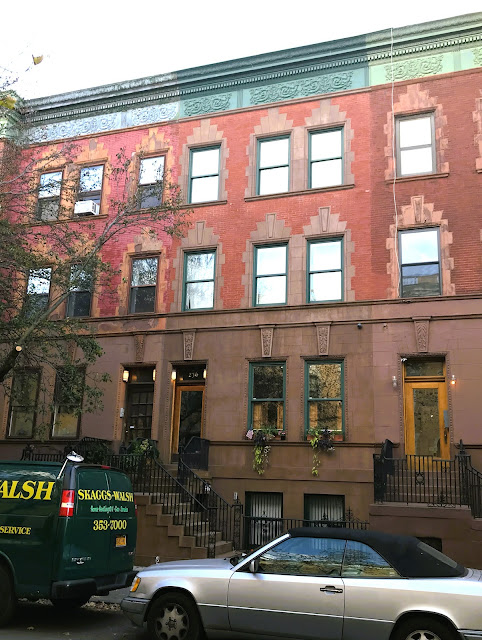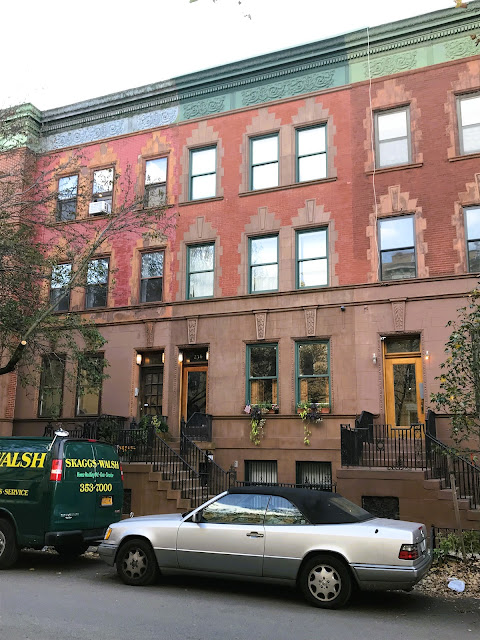The block of 25 homes on the south side of West 138th Street between today's Frederick Douglass and Adam Clayton Powell Jr. Boulevards was completed in 1891. Part of the visionary project of David H. King Jr. known as the King's Model Houses, the homes were designed by James Brown Lord in a modern take on Georgian architecture. Each of the three-story residences were clad in brownstone at the basement and parlor levels, and red brick above.
Among them was 236 West 138th Street, which shared a split stoop with elegant iron railings with its neighbor at 234. The openings of the parlor level were trimmed in egg-and-dart carving and wore elongated, foliate-carved keystones. The upper story windows were framed in brownstone quoins and wore splayed lintels. A pressed metal cornice with an ornate fascia crowned the design.
The house became home to John Cheever Goodwin and his wife, the former Ida Drigg. The couple had married in Boston in 1878 and had 11 children. A graduate of Harvard University, Goodwin went professionally as J. Cheever Goodwin.
A playwright, librettist, lyricist and producer, his first successful libretto being the wildly popular Evangeline in 1874. The New York Times would later say that he wrote or adapted more than 40 musical comedy librettos. He was a member of the American Dramatist's Club, among others.
Goodwin worked several times with Woolson Morse, writing the lyrics for his 1890 L'etoile, for his 1891 Wang, for Panjandrum in 1893, and for Lost, Strayed or Stolen in 1896. Through those collaborations, the Goodwins and Morses became friends--something that put the Goodwins in an uncomfortable position in 1895.
On January 11 that year, The World reported that Morse's wife, actress Agnes Cecilia Riley, had walked out of their home at 30 West 24th Street and into the Goodwin house. "She is recovering from a fit of nervous prostration brought on by the recent troubles with her husband." The troubles stemmed from Agnes's brother-in-law, George F. Hoey, who "turned Woolson against me," she said. Hoey's meddling had affected his own marriage, as well. "Mrs. Morse and Mrs. Hoey are now opposed to their respective husbands, and they say that will never make up their trouble." It is unclear how long the Goodwins' troubled houseguest remained.
Sheltering Morse's wife during their marital troubles obviously did not negatively affect the relationship between composer and lyricist. On January 8, 1899, The New York Times reported that the pair's The Merry Monarch had opened in London. "Gilbert and Sullivan have seldom pleased the English fancy more thoroughly," said the article.
The following year the Goodwins left West 138th Street. Their former home became a respectable boarding house, home to attorney William H. Andrews and his wife; Sam Weingart, who was involved with the Hebrew Technical School for Girls; and the Watson W. Vredenburgh family. Vredenburgh was a former police officer and his son, Loretto was an assistant principal in the public schools. The Vredenburgh family would remain at least through 1905.
In 1916 236 West 138th Street was returned to a single-family home. Bachelor attorney and politician Thomas T. Reilley and his unmarried sister, Ellinor F. Reilley moved in following the end of Thomas's term as State Assemblyman. Prior to his election he had been head football coach at New York University.
Thomas Reilley during his New York University coaching days. from the collection of the Library of Congress.
He had little time to enjoy his new home, however. When the United States entered World War I in April 1917, he left to fight as a member of the 42nd Infantry Division of the U. S. Army National Guard, known as the "Rainbow Division."
On March 22, 1919, the New York Herald reported that Reilley had been "slightly wounded in action." The article noted that a year earlier he had been promoted to the rank of major. His injuries earned him the Distinguished Service Cross.
Reilley returned to West 138th Street following the war, and on April 26, 1920 was appointed to the New York Supreme Court. It may have been that appointment or simply the changing demographics of the Harlem neighborhood that prompted Reilley to leave 236 West 138th Street that year. The home once again became a boarding house--now populated by Black families.
Among the early residents were pianist and composer James Hubert Blake (known as Eubie), and his wife, the former Avis Elizabeth Cecelia Lee. The couple moved into rooms on the second floor. Eubie Blake was born to former slaves in Maryland in 1887. According to him, he had composed the "Charleston Rag" in 1899 when he was 12 years old, but was unable to write it down until 1915 when he learned musical notation.
On May 22, 1921, the musical Shuffle Along opened at the 63rd Street Music Hall. The New York Times wrote that it had "the distinction of being written, composed and played entirely by negroes," adding that it had "a swinging and infectious score by one Eubie Blake." The article noted that Blake had collaborated with Noble Sissle on the libretto. It was a convenient arrangement, since Sissle lived nearby at 264 West 138th Street at the time. Among the tunes to come from Shuffle Along was the highly popular, "I'm Just Wild About Harry." The ground-breaking musical would run for two years.
Two other early roomers--here by 1925--were Bill "Bojangles" Robinson and his wife, the former Fannie S. Clay. Robinson had started his career as a dancer at the age of five, appearing in local saloons and on the sidewalks in front of theaters. By the time he and Fannie moved into the house, he had a solo vaudeville act. He would first earn national fame in the 1930's dancing with Shirley Temple in a series of films.
The unmarried sisters Catherine, Madeline and Anna Whales rented rooms here by 1925. When their sister, Grace, visited that spring, they gave a party. The New York Age reported on March 14 that the women "entertained a number of her friends...Dancing and music were enjoyed and refreshments served." There were seven unmarried women invited, and nine young men. For the sake of decorum, the article noted that also present was "Mrs. Skenk, chaperone."
The lives of the boarders did not always go smoothly. Allen Stewart, who was separated from his wife, lived here in 1926. That December he picked up a copy of the New York News in which was a photograph of an abandoned child. Authorities were hoping someone could identify him. The little boy was his son, Earl. Allen Stewart rushed to New Jersey to retrieve his son.
On December 18, the Pittsburgh Courier published a photograph of Stewart and his son, with the caption that read, "'Yes, sir! That's my Earlie!' cried Allen Stewart, 236 West 138th street, New York, after rushing into Mothers' Institute, Jersey City." The article said "The mother was held on an abandonment charge."
The New York Age described Avis Blake as "one of Harlem's most gracious hostesses in whose house the sincerely pleasant atmosphere embraced all visitors," adding, "Because of her husband's connections in show business she was an integral part of his every success." In 1936, Avis was diagnosed with tuberculosis. She was taken to the Riverside Hospital, never to return to the West 138th Street house.
Three years later, on March 25, 1939, The New York Age reported, "Broadway and Harlem met Saturday at the bier of Mrs. Avis Blake, who lived at 236 West 138th street and was the wife of Eubie Blake, impresario-pianist of Harlem and Broadway." Among the notable mourners at Avis Blake's funeral were Noble Sissle, W. C. Handy, Walter Thompson, George Jones Jr., and Clarence Tisdale.
Not long after Avis's funeral, Eubie moved to Brooklyn, where he died on February 12, 1983. The West 138th Street house continued to be operated as a rooming house for decades. Then, a renovation completed in 2006 returned it to a private home, with one apartment in the basement level.
many thanks to reader Mark Satlof for prompting this post
photograph by the author
LaptrinhX.com has no authorization to reuse the content of this blog





.png)

Historically informative
ReplyDelete